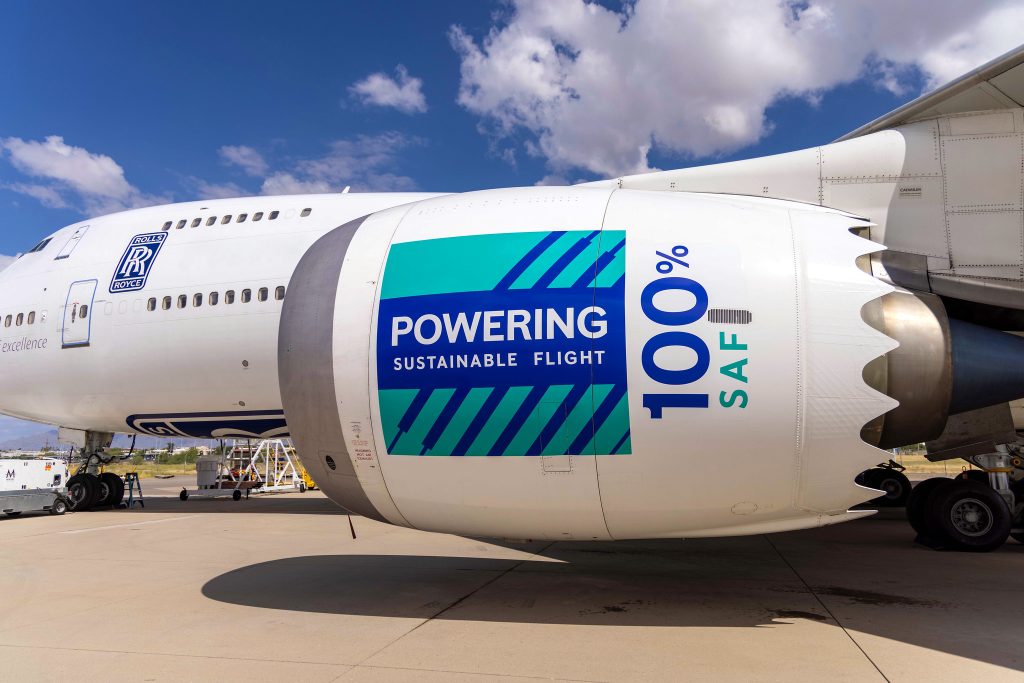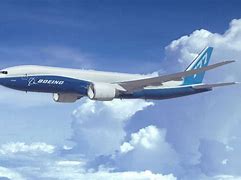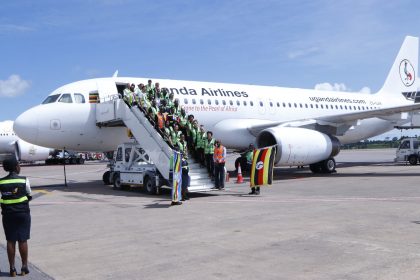Rolls-Royce success with SAF tests calms nerves at African airlines

Uganda Airlines and other operators of Rolls-Royce powered aircraft can heave a sigh of relief, after the British propulsion systems maker, announced the successful conclusion of compatibility testing of 100pc Sustainable Aviation Fuel (SAF) on all its in-production civil aero engine types.
This means that operators like Uganda Airlines, whose A330-800 widebody aircraft are powered by Rolls-Royce Trent 7000 engines, can switch to using SAF without incurring any additional costs from modification of the powerplants.
The announcement comes at a time when African airlines were getting jittery about the financial implications of EU rules, which will require all operators into EU airspace to fly their aircraft on fuel with a blend of 2pc SAF starting 2025 and 100pc SAF by 2030. While the cost of SAF (currently 3x the price of conventional aviation fuel) remains a concern for African airlines, the other fear was that huge financial investment would be required to reengine aircraft.
“This fulfils a commitment, made in 2021, to demonstrate there are no engine technology barriers to the use of 100pc SAF,” Rolls-Royce said in a statement November 11.
During a panel discussion at this year’s edition of Aviadev Africa in Nairobi this past June, chief executives of African carriers expressed fears that complying with SAF regulations in the northern hemisphere would impose new capital demands at a time when the industry was still struggling with the lag effects of Covid-19 disruptions. Many are still deep in debt and any additional costs could tip them over.
According to the engine maker, the test regime was concluded with a ground test on a BR710 business jet engine at the company’s facility in Canada. Other engines tested as part of the programme were the veritable Trent 700, Trent 800, Trent 900, Trent 1000, Trent XWB-84, Trent XWB-97, Trent 7000, BR725, Pearl 700, Pearl 15 and Pearl 10X.
Testing involved a variety of ground and flight tests to replicate in-service conditions with all the tests confirming that the use of 100pc SAF does not affect engine performance.
“Becoming the first jet engine manufacturer to publicly confirm all our in-production engines for long-haul aircraft and business jets are compatible with 100pc SAF, is an important milestone for both Rolls-Royce and the wider aviation industry,” said Tufan Erginbilgic, CEO, Rolls-Royce plc.
“It’s also further evidence of our commitment to becoming a net zero company by 2050 and supporting our customers to do the same,” he added.
Simon Burr, Group Director of Engineering, Technology and Safety, Rolls-Royce plc, described the development as “ an important milestone, not just for Rolls-Royce, but also for the wider civil aerospace industry. We hope the success of these tests provides a level of technical validation that supports those who seek to invest in the production of 100pc SAF going forward.”
In addition to proving in-production engine compatibility, Rolls-Royce has also ensured that its new generation UltraFan engine demonstrator is SAF compatible. Its first run, earlier this year, was on 100pc SAF.
An elated Mark Harper, the UK’s Transport Secretary, bragged that the world’s journey to decarbonising flight” is powered by British innovation and backed by the UK Government, meaning people can continue to travel how they want, in a way that’s fit for the future.
Today’s news demonstrates that Rolls Royce and the UK are global leaders in decarbonising transport, taking us one step closer to Jet Zero.”
Later this month, Virgin Atlantic is set to make the world’s first transatlantic crossing, using 100pc SAF to run the Trent 1000 engines on its Boeing 787 Dreamliner. The Virgin Atlantic led consortium, sponsored by the Department for Transport, includes Boeing, University of Sheffield, Imperial College London and Rocky Mountain Institute. The return flight, on regular jet fuel, will prove the engine and aircraft can run on either fuel type without engineering changes.
Sustainable Aviation Fuel has great potential to support aviation’s energy transition journey, as a “drop-in” fuel that can simply be used as an alternative to conventional fuel.
When the lifecycle of SAF is taken into consideration, IATA (International Air Transport Association) estimates the net CO2 lifecycle emissions of unblended SAFs are up to 80pc lower than conventional fuel.
Rolls-Royce estimates that to reach Net Zero flying by 2050, a combination of highly efficient latest-generation gas turbines operating on 100pc SAF is likely to contribute around 80pc of the total solution.
The international standards body for jet fuel, ASTM International, currently permits up to a maximum of 50pc SAF to be blended with 50pc conventional jet fuel. All Rolls-Royce in-production civil aero engines are already certified to operate on a blend of 50pc SAF. The successful 100pc SAF tests will provide further support for a pathway to commercial flights on 100pc SAF.

 Brussels Airlines to announce Nairobi service
Brussels Airlines to announce Nairobi service
 SITA promises enhanced travel experience after Materna acquisition
SITA promises enhanced travel experience after Materna acquisition
 Saudia’s 105 aircraft order stretches A320neo lead over rival Max
Saudia’s 105 aircraft order stretches A320neo lead over rival Max
 Boeing refuses to pay hackers $200 million for stolen Data
Boeing refuses to pay hackers $200 million for stolen Data
 Uganda-Tanzania announce date for second joint business forum
Uganda-Tanzania announce date for second joint business forum
 Uganda Airlines leased A320 arrives in Entebbe
Uganda Airlines leased A320 arrives in Entebbe
